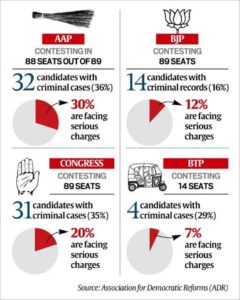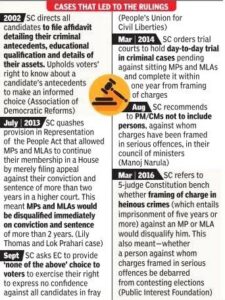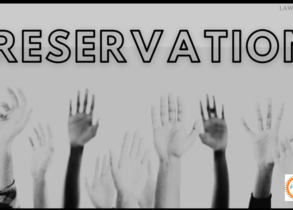Democracy interrupted: The rising number of criminals in politics
GS Paper II: Parliament- structure, functioning and conduct of business, impact of criminalisation of political etc.
Article Summary:
- The rising number of elected representatives with criminal backgrounds in Parliament and state legislatures is a matter of deep concern to all law-abiding and right-minded citizens.
- The increasing trend of criminalisation of politics is dangerous and has steadily been eating into the vitals of our democratic polity along with growing corruption of a humongous nature.
- This perilous drift needs to be checked both by all political parties as well as the judiciary.
Context: There has been a spike in the number of candidates facing criminal charges in Phase 1 of Gujarat Assembly elections, with 21 percent of candidates declaring criminal cases against them in their affidavits as per a report released by Association of Democratic Reforms (ADR).
Criminalization of politics:
- The criminalization of politics means the participation of criminals in politics. Means that persons with criminal background contest in the election and get selected as a member of parliament or state legislature.
- It is said that the politics had reached a stage where the lawmakers became the lawbreakers.
- In a democratic country like India, the increasing nexus between criminals and politics threatens the survival of true democracy. It is now becoming a trend, people with criminal backgrounds have more influence in politics than people without criminal backgrounds.
- As per media reports of February 2022: Number of pending criminal cases against sitting and former MLAs and MPs had risen to close to 5,000 towards the end of December 2021.
The increasing percentage of members of parliament who have a criminal background:
- 2004- 24%
- 2009-30%
- 2014-34%
- 2019-43%
Nearly 50% of MPs in the new Lok Sabha have criminal records. The increasing number of members with criminal records in parliament threatens the survival of any true democracy.
Reasons for Criminalization of Politics:
- One of the most important reasons for the criminalization of politics is the increasing nexus between politicians and bureaucracy.
- Vested Interests: The increasing interference of politicians in administration may be regarded as another reason for the criminalisation of politics.
- Use of Muscle and Money Power: At the time of the election, political parties spend a huge sum of money buying the votes for another illegitimate purpose. The people don’t pay attention to the people to whom they are going to cast their vote, whether he has any criminal background or not.
- Lack of Enforcement: The poor governance of the country also plays an important role in increasing the criminalization of politics. It doesn’t have the proper laws and rules for governing the procedure of the election.
- No retirement policy in Indian politics
- Corruption
- Divisions in the Indian political system:The Indian political system is based on divisions in which our Indian society exists.People tend to vote based on the candidates’ caste, ethnicity, religion, community, and linguistic lineage.
Why are criminals joining politics in India
- Criminals are joining politics in India for a variety of reasons. The first reason is that crime pays. Getting into the legitimate sphere of politics is a way to legitimize one’s gains from crime and power their finances further.
- The second reason is the lack of opportunities in other fields. In some cases, criminals have been pushed out of their traditional fields due to economic liberalisation and changing labour markets, and so they see politics as an opportunity to make a living without breaking any laws.
- The third reason why criminals join politics is that they tend to be more highly motivated than other politicians and thus more likely to deliver on electoral promises, such as providing employment or development projects which can improve people’s lives.
Legal aspects/Constitutional provisions on disqualification of criminal candidates:
- The law commission in its 179th report recommended an amendment to the Representation of people act 1951. It suggested the people with criminal backgrounds should be disqualified for five years or until acquittal.
- It also recommended that the person who wants to contest the election must furnish details regarding any pending case, with the copy of the FIR/complaint, and also furnish details of all assets.
- In a decision of the Supreme court in the Association of democratic reforms, the representation of people Acts 1951 was amended by inserting section 33-A which requires a candidate to furnish information on whether he is accused of any offence with imprisonment of two years or any pending cases in which charges have been framed and whether he has been convicted for one year or more.
- The representation of people Act (RP Act) 1951 mentions the criteria to disqualify a person to contest the election:
- Section 8 of the Act says that a person punished with a jail term of more than two years cannot contest election for six years after the jail term has ended.
- The law does not bar any person who has criminal cases pending against him. Therefore, the disqualification of candidates with criminal backgrounds depends on their conviction.
Impact of increasing criminalisation of Politics:
- Good governance gets seriously undermined
- Control of bureaucrats by political bosses: They subvert the system to serve their interests.
- Bureaucratic system: It ceases to resist corruption and often embraces it to carry out the diktats of criminal political bosses.
- Three main pillars of our democracy(Parliament, judiciary and executive): They get progressively weakened, and the fundamental concept of a democratic system gets subverted.
- Against the Principle of Free and Fair Election
- Causes Social Disharmony
Steps taken to tackle criminalisation of Politics:
- Vohra Committee(1993): It warned and said, “some political leaders become the leaders of these gangs/armed senas and, over the years, get themselves elected to local bodies, state assemblies and the national Parliament.”
- Supreme Court(2002): Every candidate contesting election has to declare his criminal and financial records along with educational qualifications.
- Supreme Court(2005): Sitting MP or MLA will be disqualified from contesting the election if convicted and sentenced for imprisonment for two years or more by a court of law.
- 12 special courts for a year by government(2017): To fast track the trial of criminal cases against MPs and
Supreme court on criminalisation of politics:
Way Forward
- Timely corrective measures need to be put in place without any further delay, for the common man to have faith in the fairness of the system.
- Time-bound justice delivery system: firmer steps by the Election Commission of India (EC) and a proper strengthening of relevant laws can cleanse the body politic of this evil.
- Fast-tracking the judicial process: It will weed out the corrupt as well as criminal elements in the political system.
- All political parties should come together: develop a consensus on keeping criminals out of the system.
- Leadership at world level: As we assume leadership at several levels on the world stage, it is important for India to showcase itself as a model democracy and the global moral compass.
- Mandatory declaration of assets and existing criminal charges in self-sworn affidavits to the EC, prior to elections, has brought in some degree of transparency.
- Fast tracking trials and expediting the judicial process through a time-bound justice delivery system.
- Nexus: between crime, money and muscle power should be on check regularly.
- The growing dependence of political parties on criminals for muscle power and “electability” must be stopped.
- Parliament, judiciary and executive: They will have to find common ground to put firm mechanisms in place to deal with increased criminalisation of politics.
Mains Question:
Q. To what extent, in your view, the Parliament is able to ensure accountability of the executive in India?(UPSC 2021) (200 WORDS, 10 MARKS)






